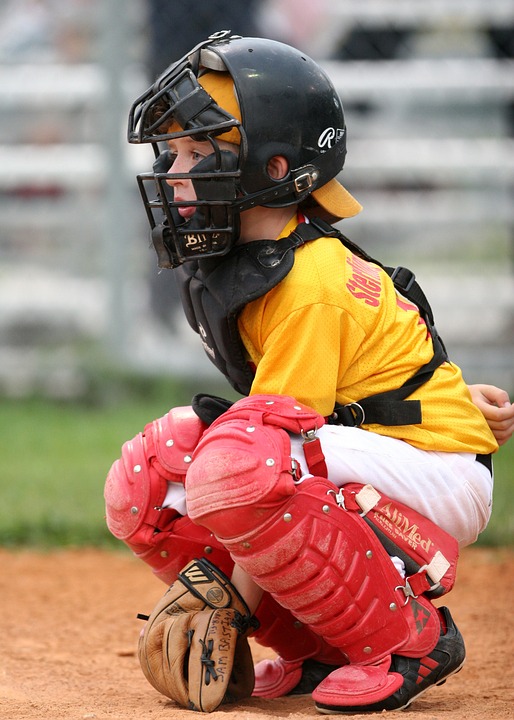There is no “I” in TEAM, But There is a “ME”
Children begin their lives in a world that is revolving around them. For the first part of their lives, most of what they do or accomplish is with help of an adult. As they transition to more independent play, their main focus is what “THEY” can do. The comprehension of a team is not the first thought in their little brains as they blossom into a self-determined toddler.

Gradually they learn to share and play with others. When a Sport comes into play, especially a new sport, children revert back to their independent ways. As they learn to master a new skill, their thoughts fall back into a, “I” can do this mentality. This is just until they can expand on the thought and include others in this skill.

Before the idea of playing as a team enters their big beautiful brains, they first think if they can first accomplish this task. During the first few practices, you may notice your child struggling for ball control or balance, focusing on their own actions as they attempt to grasp this new skill. Once the first game rolls around, it’s not uncommon to see children hogging the ball. This is not to be mean or in an attempt to reap all the glory. It’s simply that they are focused on what THEY are doing. Trying to keep the ball in bounds or making sure they are in the right position.
No Tears on the Field
OK, so breakdowns will happen. They just do. Some kids handle failure in stride, others cannot process so much emotional trauma and the water works are on the field. The key here is to encourage, be kind, and be soft with your words. As competitive as we can get in sports, it’s easy to raise our voice or speak in haste. (If you ever witness my hubby watching football, it’s a frightening sight.)

Your little one is already a ball of mixed emotions. They are excited about the new game, happy to be with new friends, stressed about keeping the ball in bounds, running the correct way and they want to impress you. The last thing you want is for them to think they are in trouble. This will discourage them, making them feel as though they are no good and more likely to quit altogether.
Console your little one until they can calm down. Suggest they take a break on the bench and take a few deep breathes to relax, breathing in through the nose out through the mouth. Once the tears seize to fall, give them some water and explain that it takes practice to accomplish a goal. Give an example, like cooking dinner. Explain that “Mommy was not always a good cook, but after lots of practice you got better.”

You can get creative with how you want to set up your example. Give details of your own failures so they see that it’s ok to fall short from time to time. Perhaps you burnt some cupcakes so bad the house was filled with smoke and the neighbors called the Fire Department thinking the house was on fire. Or perhaps you attempted to mow the lawn only to have the mower run rogue and take off across the street, sans you. Make it funny to egg on a few smiles. Expressing that failure is ok and making mistakes is expected. This will prompt them to accept a few misses with no tears.
TEAM also spells “MATE”
Your child has TEAMMATES. Once it’s established that they CAN do this and with practice they will succeed, it’s time to explain how they are a part of a TEAM. Some children feel defeated despite your best efforts when they miss a goal or a swing. Arms crossed they stomp off the field with a look of disgust. They claim, they can’t do it and they are done.

Here is where you will convey the importance of a team. Point out that to your child that their team is counting on them to help play this game. Win or lose, “the team needs them” to follow through with the plays so they can excel in the sport. Taking the “ME” out of the situation is a way to open your child’s mind to the idea that a team is a unit.
One person may do well and another may do better but as a group they are successful. Alone they are not a TEAM. It’s important to point out that each player has their strengths and weaknesses, all are different. Some may be better at kicking, others aim, and others coordination, but together you make a powerhouse of a team. Your child will see that their moment of pouting is not beneficial to the team and they will want to help out their friends.

These are just a few pointers on How to Encourage Young Kids in Sports. There are many tools to get your children to engage in new activities in a positive light. I hope these tips may help you if you find your child struggling in a new endeavor. Please share your success and fails in this crazy adventure of parenting we are on. What did you do to encourage your kids in Sports?
Make something magical with your kids. This craft is sure to please the whole family.






18 Comments
Thanks for this! I read the other day that most kids quite team sports around 13 because it’s not fun anymore – because of parents! These were good tips for kids AND parents!
How interesting. I don’t doubt it. It can be a challenging period and takes patience on both sides.
I have 2 girls and am a big fan of life lessons a good sport teaches you. My older daughter already has that team mentality but I have to work on my younger one and these are great tips!
I’m so glad to hear they can be of use. Our oldest is a ball of emotional ups and downs. I found these were the best ways to encourage him in his activities. I hope they help you as well.
Great post! I really like how you used the example of you practicing your cooking, I think that would absolutely normalize the struggle that your child is going through!
Great post! My husband is a fieldhockey coach and he works a lot with little kids. Ours is too young still but i would love for him to start team sports as well in a couple of years.
That is awesome! I give your man big kuddos for putting forth his time to educate the youngsters. I see a lot organizations having a difficult time finding coaches and I truly appreciate those who partake in educating our children.
This is a really great post. No “I” in team. Thanks for sharing so many great tips.
This is great. I meet so many kids that aren’t part of anything and would grow so much by being part of a team.
I agree. I find that introducing children to an activity that requires a group effort to be successful is a great way to open their minds and encourage new ways of learning.
Thanks for the tips. My little guy just started soccer this year, and it’s been interesting to try to teach him about being a good sport.
I can relate. I wrote this with our experience in mind. I wanted to share what worked for us and our crazy littles.
Sports can definitely be a really fun and healthy way of encouraging sportsmanship and team work
I don’t have kids yet, but I didn’t dig sports while younger, I sure hope my kids would — I missed out on a lot.
Raising kids to be team players is such a challenge and you list out how to handle them in one great post. This post is so timely for me as my older kid finds team sports intimidating and I want him to learn how team dynamics work for an easier transition. Thanks for sharing!
Team sports are so important. At the moment my son’s only 5, and although he plays football at lunchtimes at school, mostly he loves tennis. But I know the value I got out of team and individual sports, so I’m just hoping that he enjoys them enough once he gets to secondary school (his primary school is small so they rarely have enough children for team matches)
We experienced that dilemma as well with younger team Sports and activities. There were times when the couches would pull other players from other teams that had finished their games to fill positions. It was crazy, but the kids had fun.
We always let our kids try anything that they wanted. The rules were that they had to finish the season. They could not quit. They had to attend all of the games and the practices, even if they did not play. We made them realize that they made a commitment, and they had to live up to it. The team was counting on them. It paid off. They still have that sense of commitment. They are passing it down to their sons.
I agree. They made the commitment, they must not leave their team hanging. Such a great way to educate kids in regards to accountability.